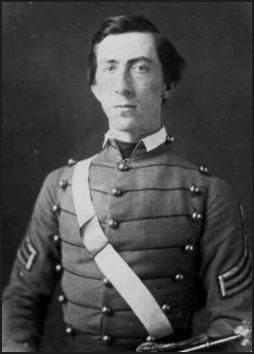Arthur Henry Dutton facts for kids
Quick facts for kids
Arthur Henry Dutton
|
|
|---|---|
 |
|
| Born | November 13, 1838 Wallingford, Connecticut |
| Died | June 5, 1864 (aged 25) Baltimore, Maryland |
| Buried | |
| Allegiance | Union |
| Service/ |
United States Army Union Army |
| Rank | |
| Commands held | 21st Connecticut Infantry |
| Battles/wars | American Civil War |
Arthur Henry Dutton (born November 13, 1838 – died June 5, 1864) was a brave American soldier. He was a very smart student, graduating near the top of his class at West Point, a famous military school. He became a military engineer and an officer in the Union Army, fighting in important battles during the American Civil War.
Arthur Dutton helped create and lead the 21st Connecticut Volunteer Infantry starting in 1862. Sadly, he was badly wounded in a battle called Bermuda Hundred in May 1864 and passed away soon after. After his death, he was given the honorary rank of Brevet Brigadier General.
Early Life and Education
Arthur Dutton was born in 1838 in Wallingford, Connecticut. His parents were Samuel and Emily Dutton. He married Marion Sands Franklin, and they had a son, also named Arthur. His brother, Clarence Edward, was also a soldier and served in Arthur's regiment during the war.
On September 1, 1857, Arthur Dutton began his studies at the United States Military Academy at West Point. He was an excellent student and graduated on June 24, 1861, as the 3rd best student in his class of 34 cadets. Because he did so well, Dutton was able to join the special U.S. Army Corps of Engineers. He was made a brevet second lieutenant on the same day he graduated. Later, on August 3, he became a full Second Lieutenant in the regular army.
Service in the Civil War
At the beginning of the Civil War, Arthur Dutton worked as a staff officer for General Joseph K. Mansfield in Washington, D.C.. He then took command of the defenses in Fernandina, Florida.
In the fall of 1862, Dutton started to organize and train the 21st Connecticut Infantry Regiment in Norwalk. On September 5, he became the colonel and leader of this new unit. His regiment joined the IX Corps of the Army of the Potomac. They moved to Washington on September 11 and later to Arlington Heights in Virginia to help defend the capital. In December, Dutton and his regiment fought bravely in the Battle of Fredericksburg.
For his actions at the Battle of Fredericksburg on December 13, Dutton was given an honorary promotion to major in the Regular Army. He then led his regiment during the difficult Mud March in January 1863. In February, he began leading a larger group of soldiers called a brigade within the IX Corps. On March 3, he was promoted to First Lieutenant in the Regular Army.
Dutton later went to North Carolina and took part in the Siege of Suffolk in April and May. There, he led a brigade of the VII Corps. For his efforts in defending Suffolk, he received another honorary promotion, this time to lieutenant colonel in the Regular Army. On October 2, he was promoted to the rank of Captain in the Regular Army. From January to February 1864, he was stationed at Newport News, Virginia. After that, Dutton led a brigade in the XVIII Corps of the Army of the James.
Final Battle and Death
On May 26, 1864, Arthur Dutton was in Bermuda Hundred and was ordered to scout out the enemy Confederate positions with his brigade. He advanced about 2 miles and was on the skirmish line near Proctor's Creek. There, he was hit by a shot that wounded him very badly.
Arthur Henry Dutton died from his wounds on June 5 in Baltimore, Maryland. He was buried at Arlington National Cemetery in Virginia. His family also placed a special monument, called a cenotaph, in his memory at the In Memoriam Cemetery in Wallingford, Connecticut. After his death, he was given honorary promotions to Colonel in the Regular Army and to Brigadier General of Volunteers for his brave actions at Bermuda Hundred.
One of his fellow officers spoke highly of him:
Colonel Dutton dies from the effects of his wounds June 5th. He graduated at West Point in 1861, Kilpatrick, Custar, O’Rourke, Benjamin, and Farquhar being among his classmates. Bold and chivalrous, with a nice sense of honor, a judgment quick and decisive, an unwavering zeal in his chosen profession, he was in every respect a thorough soldier. By his companions in arms he will never be forgotten, and to them his last resting place will be as a shrine commemorating the friendships which not the rude shock of war, nor lapse of time, can blight or destroy.
Images for kids
 | Janet Taylor Pickett |
 | Synthia Saint James |
 | Howardena Pindell |
 | Faith Ringgold |



